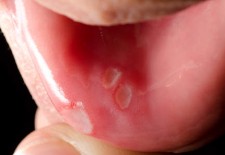 A canker sore is a small, shallow lesions that develop on the soft tissues in your mouth or at the base of your gums. According to the Mayo Clinic, the exact cause of canker sores remains largely unknown. However, scientists have developed a list of factors that can contribute to a person have canker sores.
A canker sore is a small, shallow lesions that develop on the soft tissues in your mouth or at the base of your gums. According to the Mayo Clinic, the exact cause of canker sores remains largely unknown. However, scientists have developed a list of factors that can contribute to a person have canker sores.
These possible triggers include:
- A minor injury to your mouth
- Toothpastes and mouth rinses containing sodium lauryl sulfate
- Food sensitivities
- A diet lacking in vitamin B-12, zinc, folate (folic acid) or iron
- An allergic response to certain bacteria in your mouth
- Helicobacter pylori, the same bacteria that cause peptic ulcers
- Hormonal shifts during menstruation
- Emotional stress
There are also some diseases and conditions that some people may have that make them more at risk for obtaining canker sores. These conditions and diseases include:
- Celiac disease
- Inflammatory bowel diseases, such as Crohn’s disease and ulcerative colitis
- A faulty immune system
- HIV/AIDS
There are several types of canker sores, including minor, major and herpetiform sores. Most canker sores will appear in the mouth as round with a white or yellow center and red border. These sores can be on or under your tongue, inside your cheeks or lips, at the base of your gums, or on your soft palate. You may notice a tingling or burning sensation up to two days before the sores actually appear.
Canker sores generally go away on their own. However, if you have an unusually large canker sore, persistent sores that last for weeks, extreme difficulty eating or extreme pain as a result of the canker sore, you should consult your doctor.
Do you have more questions about canker sores? Contact our professionals at DentaLux today, or leave us a comment below!







Leave a Reply